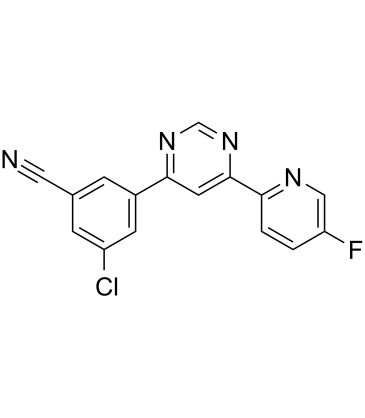HTL14242
Modify Date: 2024-01-09 22:06:24

HTL14242 structure
|
Common Name | HTL14242 | ||
|---|---|---|---|---|
| CAS Number | 1644645-32-8 | Molecular Weight | 310.71 | |
| Density | N/A | Boiling Point | N/A | |
| Molecular Formula | C16H8ClFN4 | Melting Point | N/A | |
| MSDS | N/A | Flash Point | N/A | |
Use of HTL14242HTL14242 (HTL0014242) is an advanced, orally active and potent mGlu5 NAM with a pKi and pIC50 value of 9.3 and 9.2, respectively[1]. HTL14242 can be used for the study of Parkinson’s disease[2]. |
| Name | HTL14242 |
|---|
| Description | HTL14242 (HTL0014242) is an advanced, orally active and potent mGlu5 NAM with a pKi and pIC50 value of 9.3 and 9.2, respectively[1]. HTL14242 can be used for the study of Parkinson’s disease[2]. |
|---|---|
| Related Catalog | |
| Target |
mGlu5 |
| In Vitro | HTL14242 is stable in rat plasma, inactive at the hERG ion-channel, and has a clean profile in vitro assays of cytotoxicity in HepG2 cells, the TC50 is >90 μM[1]. |
| In Vivo | HTL14242 (oral administration; 1, 3, or 10 mg/kg; sacrificed 1 h postdose) emonstrates an excellent, dose-dependent occupancy of mGlu5 receptors from an oral dose, with an estimated ED50 of 0.3 mg/kg[1]. HTL14242 (oral administration; 1 mg/ml) exhibits an oral PK Profile, the t1/2, AUCinf and F% are 6.5 hours, 3946 ng/h/mL and 80%, respectively in dog[1]. Animal Model: Dog (PK study)[1] Dosage: 3, 10 and 30 mg/kg Administration: Oral administration; single dose Result: Had a good PK characteristics in dogs. |
| References |
| Molecular Formula | C16H8ClFN4 |
|---|---|
| Molecular Weight | 310.71 |